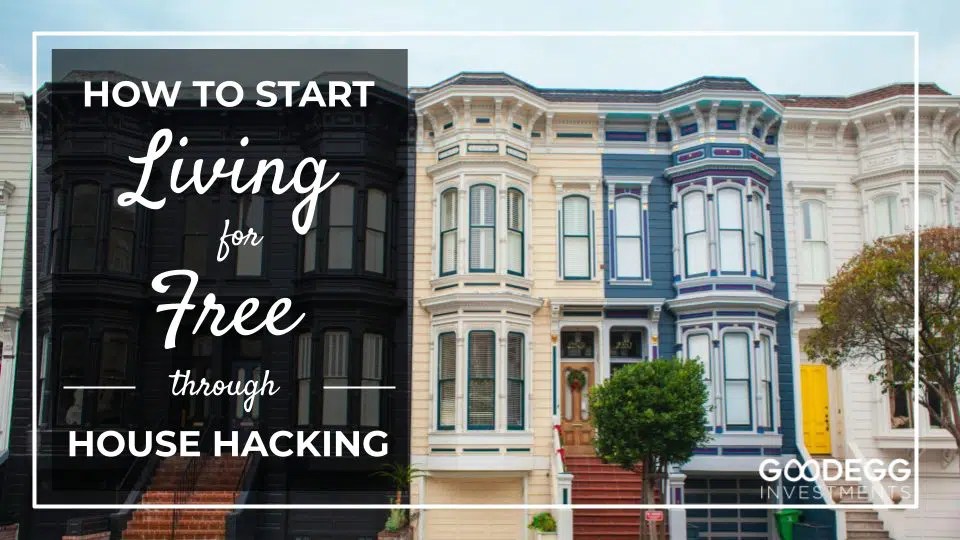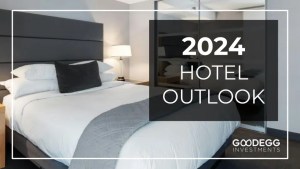I’ll start by saying anyone can do it, and it’s okay if you haven’t heard of “house hacking” before or don’t know what it is. If you’ve been thinking about buying a home and have felt the desire to reduce your living expenses simultaneously, you’ve been leaning toward house hacking without even realizing it!
I, too, was house hacking before I even knew what that term meant. Maybe you’ve thought about buying a duplex and renting out one side while living in the other, or you’ve been looking at single-family homes and considering renting a room or two. Well, you’re in the right place!
In this article, you’ll learn what house hacking is, how to decide if a real estate property is worth it, how to get started on your first house hack, and how to stockpile your earnings from one property to buy the next and continue to build your wealth as a real estate investor.
What Is House Hacking?
Any time you’re living in one portion of your primary residence and renting out another room, unit, or space, you’re essentially house hacking. You can do it with any small multifamily property like a duplex, triplex, or larger, and, surprisingly, you can even do it with a single-family home!
Our First House Hack
Since you’re probably wondering how to house hack your first property, when we were just 22 years old, we found this gem of a duplex. I say that with sarcasm and love because while the upstairs of this multi-unit property was in decent shape, the bottom floor had previously been used as a brothel, so we had our work cut out!
As ambitious 20-somethings with no kids, we knew with patience and some elbow grease we would soon be real estate investors with tenants in our downstairs rental property. These paying tenants would be covering our monthly mortgage payment while we lived upstairs for free, minus our basic living expenses. Wide-eyed and bushy-tailed, we were about to become real house hackers!
How House Hacking Became Profitable For Us
Years later, we still own that original multifamily property from our 20s and have moved into, renovated, and rented out many more units, up to four units at a time, in small multifamily properties following this formula.
With each house-hacking move, we lived in one of the units, repaired the other potential rental spaces, and found tenants who would cover the monthly mortgage payment, if not more, through their rent. This type of real estate investing created monthly equity and cash flow for us, and this is exactly how house hacking works.
Are you ready to take advantage of house hacking and become a real estate investor who brings in consistent rental income creating steady cash flow?
Start House Hacking With Just Two Simple Steps:
The first step is to save up your down payment and get qualified for the proper investment financing option.
The second step is to determine if you can find a single-family house with a spare bedroom, a place with a garage apartment, or even a property with a basement apartment that could make a good house hacking investment.
Successfully house hack your first place within the next few months just by following these two steps. Let’s break this down a little further.
House Hack Using Owner-Occupied Financing
First, let’s explore the money piece. You’ll need a down payment plus some financing whether you want to house hack a single-family house or multi-unit property.
Earlier in this article, I mentioned we purchased investment properties “up to four units.”
This is the maximum number of units you can purchase while using owner-occupied financing. Owner-occupied means you live there too, and there’s special financing available for these types of mortgages, which is the ultimate step toward successful house hacking.
So, why is owner-occupied financing so great?
Owner-Occupied Financing vs Investment Property Financing
Owner-occupied financing requires a much lower down payment percentage than if you were to buy a property as a straight investment. Using owner-occupied financing terms through the Federal Housing Administration (FHA loan), you can get down payments as low as 3.5%. If you qualify for a VA loan, you can get a 0% down payment on your primary home.
That’s a shocking difference in down payment and a much lower barrier for soon-to-be house hackers compared to the regular investment financing down payment requirement, which is usually 20-25% of the purchase price of the investment property.
Conventional loans do have a place in the house hacking strategy as you continue to pursue extra income, but for your first multifamily property, you should do everything in your power to minimize the barriers for yourself, and minimizing the required money down is an impactful way to do that.
Banks view an owner-occupied loan as more secure since you will be living there and overseeing the property on a daily basis. House hacking in this way also allows them to assume the difference of what you’re saving from the down payment (at least 20% – 3.5% = 16.5%) may be used for renovations, repairs, and other housing expenses, only improving the condition and value of the investment property.
An improved, updated rental property will help attract tenants quickly, which will help generate the expected rental income to cover the monthly mortgage payments. This opportunity to buy rental property by qualifying for owner-occupied financing and using FHA and VA loans is the number one house hacking strategy for a sustainable and viable investment with consistent cash flow.
Determining If An Investment Property Is A Good House Hacking Purchase
The second step along your house-hacking journey is to find the property.
When shopping for the “perfect” house-hacking property, you’ve got to consider how much rental income each unit of the property will provide and compare it with the mortgage payment. Look at the purchase price of a duplex, for example, and see if the overall cost of the property would render mortgage payments that could be covered by the rental income from one unit alone.
Let me explain.
If you find a duplex for $300,000, you’ll likely apply a down payment of twenty percent, which is $60,000 in cash. That leaves you with a $240,000 mortgage loan after your downpayment. At about 5% interest on a 30-year mortgage, your monthly mortgage payments, including your mortgage insurance premium, will be approximately $1,600 each month.
It’s important to consider property taxes and insurance here and decide whether you’ll require the tenant’s rent to cover those expenses as well. Sometimes property taxes and homeowners insurance are wrapped into your mortgage, potentially increasing your payment a little.
Now, after doing this math, you’d want to look around and see what people are generally paying in rent for units comparable in size to the one you’d be renting out. This is as simple as looking at Craigslist, Zillow, or any other online hub where people share and shop for a rental property. Sometimes, you can even find a real estate agent specializing in finding tenants’ rental properties.
If the rental rates you see in the market are at or near $1,600 per month, then it’s likely you’ll be able to get a paying tenant in one side of your duplex for that amount. Then, you can live in the other side, basically for free, while your tenant’s rent payments contribute to your mortgage and build your equity in the home.
If the rent rates in the area are a little less, say $1,400 per month, then you’ll only have to pay $200 a month to cover the mortgage on the property, which is still a great deal!
Alternatively, what if you find out rental rates in the area are $1,800 per month? In this case, you’d be able to cover your mortgage and have a little cash flow right off the bat. Sweet!
Either way, you’ve reduced your housing expenses to essentially zero and gained a significant advantage toward being able to save for your next down payment on your house hacking real estate endeavor.
Run the Numbers for Your House Hack
Of course, we’re using nice round numbers here just for clarity and simplicity. But as a potential landlord, it’s important to take a few minutes to just run the numbers.
Consider what your maximum budget would be to renovate a property and ready it for a tenant. Then do some more research on what tenants pay in rent based on the updates, size, and condition of a property.
Next, write a list of any and all potential property management expenses you might incur as a landlord including plumbing calls, lawn care, repairs, and unexpected issues like a water heater failure.
Your net operating income of each property is the gross rent you get paid by your tenant(s) minus any expenses. Looking at these numbers on a month-by month basis is a great start, but you’ll get a better picture by looking at your net operating income based on 6 months or a year of your landlord tenant relationship and the costs associated with keeping up the property during that time.
Before you own your first property and have a paying tenant, these numbers are all philosophical. However it’s good to simply have an idea of what to expect and begin to set aside savings for potential expenses.
What It Takes To Get Started In Real Estate Investing
Getting started with house hacking is way easier than you think! All you need is your down payment in cash (20% of the property’s market price is required if you’re not going the FHA loan route) and some basic knowledge of the area and types of property (single-family home, duplex, triplex, or quadplex) you’re searching for.
Begin working ahead of time with a loan officer so you can get pre-qualified and begin to strategize toward a strong offer. If you have any credit blemishes or need to go the extra mile to prove your income, you have time to do this before you find the perfect property to begin your financial independence journey.
Start stashing a little extra cash in a reserve account for the potential housing expenses you identified above, like renovations, lawn services, and pest control. Some unanticipated costs of becoming a landlord may be repairs, tenant damage (intentional or not), and notary or attorney fees.
You can easily find templates for tenant applications, leasing forms, and even contractor agreements online. Take advantage of services like Angie’s list or similar to find reliable handymen for repairs to your investment property.
Once your savings goals are met, simply expand your property search to include small multifamily units in the area. You can easily do this on any home listing site like realtor.com or by asking your real estate agent.
How To “Snowball” Your Real Estate Purchases And Keep Living For Free While Investing
Once you see the magic in having your tenants pay your mortgage while you live for free, you’ll probably want to do it again and again, accumulating real estate properties and building your equity and passive cash flow as you go.
The primary investment strategy to accomplish this is, as your tenant is covering your mortgage with their rent payments, to continue to “pay rent” to yourself. Set aside at least $1,000 per month into a separate savings account as if you were still paying a monthly payment for your mortgage payments or rent. In time, this account will accumulate enough savings to cover a down payment on your next investment property.
For example, as you move out of your first investment property and get another tenant to rent your old space, you’ll suddenly have two people paying $1,600 per month, doubling your rental income. At this point, hopefully the balance has been paid down significantly since the purchase, and ou should explore refinancing the property with a conventional loan.
FHA loans are awesome in that they offer a shockingly low down payment, but the catch is that you can only have one at a time. So, in order to get a new one on your next owner-occupied property purchase, you have to refinance out of the first one.
After you refinance the old property, and qualify for a new FHA loan, you can move into a new triplex, for example. By expanding from a duplex to a triplex, you’ll accelerate the likelihood that you’ll live for free in one unit because you’ll find paying tenants to live in the other two. This allows you to increase your monthly cash flow, expand your net operating income, and save even more for the next down payment.
This is the stage at which you really begin to feel the benefits of house hacking. Your positive cash flow from your successful house hacks is not only allowing you to live for free but is also generating passive income that can cover some or all of your regular living expenses and allow you to invest even more.
Where House Hacking Might Take You – Oh, The Possibilities!
I’m sure you can continue to imagine how repeating this house hacking formula every few years and increasing the number of units with each purchase could amass fantastic cash flow, a great portfolio, and excellent tax benefits.
Do you want to quit your job and travel full time, living the life you thought was only possible in your dreams? As you generate passive income through real estate investing, you build toward financial independence and time freedom. More money means more choices, and one or two house hacking deals in, you have plenty of control over your own time and money, thanks to the expected rental income.
Now, honestly, house hacking isn’t all just rosé and chill. Being a great landlord is hard work and requires your time and attention to daily decisions about what’s best for the real estate investments and the people involved. Even if you choose to use a property management company, you’re still responsible (and liable) for every repair, tenant complaint, rent raise, and eviction (meaning you are still accountable for the mortgage payment if the renal property goes without tenants).
If you love the idea of passive income but would rather not move every few years or deal with tenants, extra housing costs, and other landlord responsibilities, group investments called syndications might better suit you. When you invest as a limited partner in a real estate syndication, you reap all the benefits of real estate investing, such as tax deductions, passive income, and property value appreciation, without dealing with landlord-type headaches.
We still own several small multifamily properties, but as a mom with two kids who would rather not move every few years, real estate syndications have become my favorite way to passively invest in recession-resistant assets, earn steady cash flow, and limit my liability so I can live the life I’ve always dreamed of with and for my family.
From here, it’s entirely up to you – Neither house hacking nor real estate syndication investing requires any experience, degrees, or certifications, and you don’t have to be experienced in one to do the other. So identify your lifestyle and investment goals first, and decide whether you’re willing to try to manage a property as a landlord with house hacking or allow expert real estate investors to do the work for you through real estate syndications.
Read my Ultimate Beginner’s Guide to Investing in Real Estate for a comprehensive overview of where you are and how you might most easily get started. House hacking and syndications are my two favorite ways to invest.





